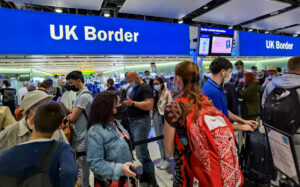
It’s a drum I’ll continue to beat, but every company, no matter how small or big their travel spend, should have a straightforward, easy-to-follow travel policy in place.
Perhaps before “you’re on mute” became part of our everyday vocab, travellers were happy to go it alone. But things have changed since the dark days of 2020, and instead of chasing the lowest fares or loyalty points, bookers and travellers are focussed on information, communication, flexibility, sustainability and safety.
There are new questions to ask and answer. For example, what measures has your company put in place to ensure the safety of women travellers? How do you support the health and wellbeing of your team when they’re out on the road? Do you provide opportunities for more sustainable travel?
A well-planned travel policy addresses all these issues, while also balancing the personal preferences of your people. It’ll leave you less exposed to risk, eliminate leakage (aka rogue bookings), and help you get a handle on your travel spend.
Sun Tzu said that if you “sweat more in peace, you bleed less in battle”. And while it may sound dramatic, the truth is if you spend a little time and effort getting your travel policy right, you’re setting yourself up for massive gains (and a lot less stress) in the long run.
Here are just five reasons to lay the groundwork now:
It’s the glue that keeps everything together
In today’s global business environment, the old ‘nine-to-five’ model is no more. Instead, organisations are juggling office-based employees, staff who are working from home, and consultants and teams that are spread across continents. Throw in tight budgets, new sustainability goals and ongoing COVID-19 complexities and there is a lot to consider.
A travel policy ensures that your team knows exactly how to book; who signs off on travel; the process for managing and submitting expenses; your company’s safety protocols; and what to do in case of an emergency. There is no room for interpretation, and your policy will become the glue that holds your entire travel programme together – making life easier for everyone involved.
Even ‘baby steps’ make a big difference
Drawing up a travel policy shouldn’t be a daunting or onerous process. In fact, a really solid ‘starter policy’ just covers the basics, like:
Are there any restrictions on who travels where, whether it’s locally or internationally? In other words, are any destinations regarded as high risk?
Are there any restrictions on travel during certain periods, for example, during an audit or at financial year end? And how long can your travellers be out of the office?
How should business trips be booked? Online or with a preferred TMC?
Are there any preferred partners when it comes to flights, accommodation and car hire?
Who’s responsible for signing off travel – and what is the process?
How do travellers submit their expenses, and what can (and can’t) be claimed back?
It’ll save you money
Bottom line? Having a travel policy in place is still the number one way a business can save money. And the numbers don’t lie.
With a new travel policy in hand, a client of ours, Angus Knight, managed to save:
£10K annually on accommodation; and
£15K a year on airfares; and
47% of their total travel spend by switching to our online booking tool.
By mandating and consolidating their travel spend with preferred suppliers, they suddenly had access to volume discounts, exclusive rates and plenty of perks. Crucially though, they were able to eliminate leakage – where money is lost, often invisibly, because there are no guidelines (or accountability) in place in terms of how, where and when employees can book travel.
It helps with planning, booking and reporting
A good travel policy also supports a good online booking platform, and vice versa. With Corporate Traveller’s Melon, travel bookers have access to a wide range of travel content – all aligned with your company’s travel policy and goals. What does this mean? Not only will booking and managing
travel become a whole lot simpler for travellers and bookers alike but suddenly you’ll have access to clean workable data, which is a powerful tool.
As Angus Knight realised, full visibility over your travel spend means you’re able to gather insights into your company’s travel behaviour, identify potential savings, manage your budget, and report with confidence.
In this risky era, it’s more important than ever
COVID aside, business travel can be unpredictable. Any travel policy needs to cover traveller safety and wellbeing. For example, how will you keep in touch with your travellers while they are on the road? How will you track everyone’s whereabouts for safety and security purposes? What is the emergency protocol should something happen?
Trust your TMC to help you develop a comprehensive risk management strategy that includes everything from how many travellers can fly on the same flight to insurance and medical cover.
Honestly, a travel policy should be the cornerstone of your travel programme. It’s a living document that should be reviewed and updated regularly to meet your organisation’s changing needs and sustainability goals.
No SME should be without one, which is why we’ve covered it in Corporate Traveller’s SME Corporate Travel Toolkit. This free resource will give you pointers on how to craft the perfect travel policy, where to find savings without compromising traveller safety, the pitfalls of unmanaged travel and so much more.
Read more:
5 Reasons every company needs a travel policy




